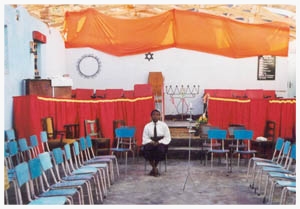Rusape, Zimbabwe
A Shona Tabernacle
Such joyous harmonies are not often found traditional Jewish choirs. Then again, the Rusape Jews are not members of a traditional Jewish community. The Jewish community centered in Rusape, Zimbabwe, claims both ancient and contemporary origins. According to community lore, the Shona people, a Bantu group that had migrated to Southern Africa from the north, were actually Jews. The community compares traditional symbols, burial rites, circumcision patterns, marriage customs and agricultural practices to those of the ancient Israelites.
The community's more contemporary origin is equally surprising. In the 1880s, a former American slave and Baptist deacon named William Saunders Crowdy had a "visitation" from God who told him that he should lead black people to Judaism. "Prophet" Crowdy understood that his being black and openly Jewish could scare people away from his mission so he started a church and named it the "Church of God and the Saints of Christ."
"In the early 1900s, an African visitor brought Crowdy's teachings back from America. Today there are several thousand members of Crowdy's Jewish community spread across Central Africa, Zimbabwe, Malawi and Zambia. While some Church of God members have been reluctant to abandon prayers invoking Jesus, the Rusape group no longer considers Jesus the Messiah. They contend that all men are Sons of God - not just Jesus - and attempt to follow the Old Testament the way they believe Jesus did.
Today the Rusape community has begun to connect with Western visitors who have provided them with Jewish objects and have encouraged them to pursue their Jewish studies. Despite the uncertain political climate in Zimbabwe, the Rusape Jews are no longer afraid that they must hide their religion. They claim that they are Jews today, and that their past and future are with the Jewish people.
Jay Sand visited the Jews of Rusape in September, 2000, and will present them in vivid text, alongside photographs that Sandy Carter has took during a visit, in Scattered Among the Nations.
Every Saturday morning over a hundred members of the Rusape, Zimbabwe, Jewish community gather at their "tabernacle" for Shabbat prayers. Members of the community, young and old, wear their absolute best -- brown three-piece suits for the men and brilliant turquoise blouses and jeweled hair wraps for the women.
"Rabbi" Ambrose Makuwaza leads the congregation in prayer. The sermon of the day explains the origin of the ancient Jewish custom of washing the feet before entering a house. Makuwaza explains the tradition, identified in the area with Jesus and Christianity, as a custom that was popular among the ancient Jews. Many members of the congregation have Christian relatives or used to be Christians themselves. Makuwaza often emphasizes the Jewish origin of "Christian" traditions.
Young "Cantor" Martin leads the Rusape Tabernacle community choir in prayer. The choir practices several times and week and works dilgently to perfect its intricate harmonies and choreographed marches.
Solomon Guwazah, a railway clerk and musician who lives in the small Zimbabwean city of Rusape, converted from Rastafarianism to Judaism several years ago when he decided that his people, the Shona people of Southern Africa, very likely descended from the ancient Jews. He, and many other community members who have come to the same conclusion, based this belief on the fact that many Shona cultural practices are more similar to those found in the Old Testament than to those practiced by Zimbabwean Christians. He is shown here blowing a shofar made of a kudu horn.
After Shabbat services outside of Rusape, Zimbabwe, Grace sits by herself in the empty tabernacle.





